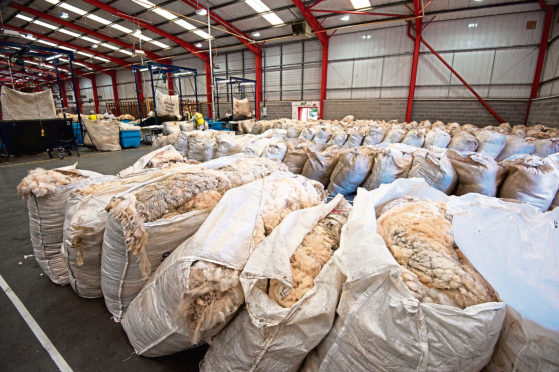Wool prices will be severely impacted by the Covid-19 crisis for the next 12-18 months, warns British Wool.
The marketing body, which is owned by approximately 40,000 sheep farmers across the UK, says the coronavirus pandemic has had a significant impact on global demand for wood.
The organisation’s chief executive, Joe Farren, said British Wool experienced reduced demand for wool from the Chinese market in January. Thereafter, the global market for wool from cross-bred sheep slowed significantly in February, and it has been shut since March.
Mr Farren said February to May was usually the busiest selling period of the year, and as a result of market closures the body has around an extra seven million kg of unsold wool from 2019, on top of three million kg of wool normally handled at this time of year.
“The severe, hopefully short-term, drop in demand for wool products coupled with the huge global overhang in cross-bred wool stocks from the 2019 season is likely to severely impact prices for the next 12-18 months,” said Mr Farren.
“It will also make our longer-term objective of repositioning British Wool as a premium product more challenging.
“Wool producers can be assured that British Wool will be at the forefront of leading the growth and renewal of wool values, but this will take time.”
He said that British Wool’s depots and collections sites were ready to start receiving wool, and protocols are in place to ensure the safety of producers and British Wool staff.Meanwhile, Dumfries farmer Jim Robertson has been elected as British Wool’s new chairman.
Mr Robertson, who runs a flock of 950 South Country Cheviots and 50 Texels near Langholm, said: “British Wool has implemented a Covid-19 response plan to ensure we continue to operate effectively but in a safe manner.
“Wool producers can be assured that I, as chairman, with the support of my fellow board members, will represent your best interests and despite the short-term challenges posed by Covid-19, by working together we will come out of this stronger.”
The National Sheep Association (NSA) welcomed confirmation depots and collection sites were open for business.
NSA chief executive, Phil Stocker, said: “With so much uncertainty generally, we welcome that we are in a situation where shearing gangs can operate and wool can be moved.”
